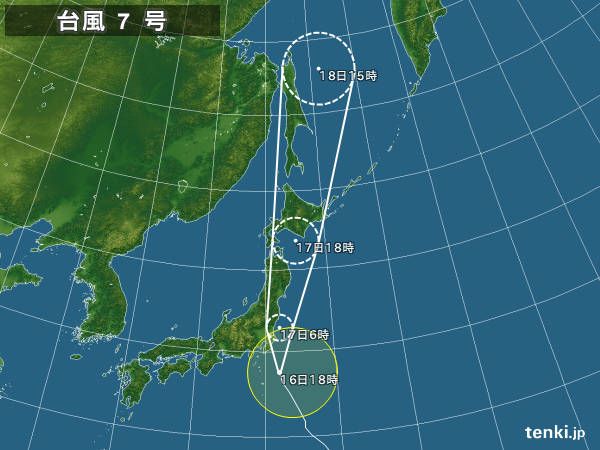With September coming around, you were relieved to feel the weather cooling down. Or so you believed. As the typhoon season reaches its peak, your perfect kit to go out is an umbrella, a raincoat, and some good rain boots.

A typhoon (台風) is a tropical cyclone with strong winds occurring in the west Pacific while in the Atlantic, they are called hurricanes. They are accompanied by heavy winds, floods, storm surge, and torrential rainfalls. Officially, the season starts in May and ends in October. However, Japan particularly suffers from tropical cyclones passing over the islands from July until late September.
The Japanese meteorological agency can predict quite accurately the probable course of a typhoon, days in advance. They are given numbers rather than a name. You can refer to the English version of their website for more information and real-time weather updates.
- 台風第17号: 17th typhoon (in 2016)
- 台風情報 : Typhoon information
- 台風72時間進路予報: Typhoon’s course forecast in the next 72 hours
If you are living in Japan, you will need to take some necessary precautions. First, you should keep yourself informed on the progress and severity of the storm. Also, a basic understanding of weather warnings in Japanese is quite useful. Indeed, the meteorological agency calls for caution when damage may occur as a result of the strong winds and heavy rain. However, if forecasters predict heavy damages, they will release warnings.
- 大雨に関する情報: heavy rain information
- 大雨洪水警報: heavy rain and flooding warnings
In 2016, the Narita airport got temporary closed due to strong winds. Therefore, travelling in Japan during a typhoon can be difficult due to cancellation and delays. Trains are often stopped and expressways closed.
- 洪水: flood
- 地滑り: landslide
- 大雨: heavy rain
- 暴風: rainstorm
- 雷: thunder
- 雷雨: thunderstorm
- 強風: strong wind
- 暴風: windstorm
What to do in case of typhoon-related warnings? Common-sense dictates avoiding to get out. Most Japanese companies will probably consider closing for the day or encourage employees to get back home early. At home, you should secure your balcony and / or garden and avoid exposing yourself to your windows. Finally, you should draw your curtains and wait for the weather to clear up!
Are you wondering how to build your Japanese vocabulary? Why not joining an intensive course! Follow us to learn more Japanese every day.